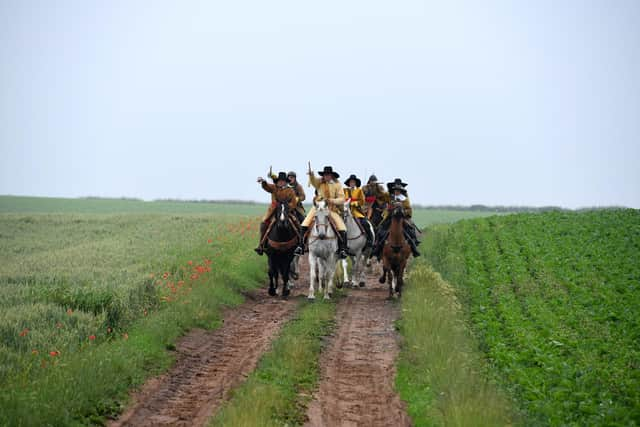Battle of Marston Moor: Archaeological drone survey reveals possible remains of burial pits from Civil War battle in Yorkshire
Tony Hunt, who runs YAA Mapping, decided to investigate farmland near York where the Battle of Marston Moor was fought in 1644. Following a siege of York by Parliamentary forces, the Royalist armies led by Prince Rupert engaged them between Tockwith and Long Marston. Oliver Cromwell was present, commanding the Parliamentary cavalry forces.
Mr Hunt was searching for the burial pits of the Whitecoats, the household guard of the Marquess of Newcastle who were massacred when they refused to surrender. The Royalists were then routed by a seriously injured Cromwell, and 4,000 left dead on the battlefield.
Advertisement
Hide AdAdvertisement
Hide AdThe field where the Whitecoats perished was named White Sike Close, and most of the common soldiers were laid to rest there as they had fallen, as was the military custom of the time, when only senior officers would be buried elsewhere. It was marked on maps under the name, though its original field boundaries that were in existence until around 150 years ago have now disappeared.


Mr Hunt used thermal imaging cameras to detect depressions in the landscape that could be the mass graves and attempt to identify White Sike. He said: “The long, grubbed-out boundaries of the close are clearly seen; but more importantly, clearly revealed in the middle of the field, exactly where marked, are three great shapes: roughly circular, and certainly not natural.
"Are these the last resting place of nearly 5,000 young men? Are these the mass graves of one of England’s greatest battles? We think they could be.
"Marston Moor was the turning point in the Civil War; the North was largely Royalist in sympathy and the defeat meant the King had lost the North. In fact, many consider that this was, to paraphrase Churchill, not the end but the beginning of the end for this most unhappy of kings who, within a few months, lost his country, his crown, his authority and finally his head."
